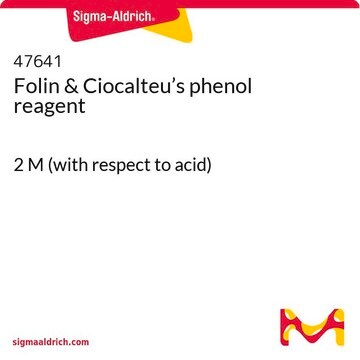F9252
Folin & Ciocalteu′s phenol reagent
suitable for determination of total protein by Lowry method, 1.9-2.1 N
About This Item
Recommended Products
form
liquid
Quality Level
concentration
1.9-2.1 N
color
clear yellow
faint yellow to very dark yellow, and Faint Green-Yellow to Very Dark Green-Yellow
pH
<0.5 (20 °C)
density
1.240 g/cm3 at 20 °C
suitability
suitable for determination of total protein by Lowry method
application(s)
diagnostic assay manufacturing
hematology
histology
storage temp.
room temp
Looking for similar products? Visit Product Comparison Guide
General description
stabilized with sodium potassium tartrate). Addition of the phenol reagent generates chromogens that give increasing absorbance between 550-750nm. Normally, absorbance at the peak (750nm) or shoulder (660nm) are used to quantitate protein concentrations between 1-100 mg/ml while absorbance at 550nm is used to quantitate higher protein concentrations.
In the absence of copper, color intensity is determined primarily by the tyrosine and tryptophan content of the protein, and to a lesser extent by cysteine and histidine. Copper(II) has no effect on color formation by tyrosine, tryptophan, or histidine, but reduces color formation due to cysteine.
Many modifications of the original assay procedure have been published, including methods for enhancing the color development, for determining the content of insoluble proteins, and for automating the procedure. Compounds including many buffers, chelating agents, detergents, and cyclic organic compounds can interfere with the Lowry protein assay.
Folin & Ciocalteu′s phenol reagent can also be used as a spray reagent in chromatographic procedures.
Application
Other Notes
Linkage
related product
signalword
Danger
hcodes
Hazard Classifications
Eye Dam. 1 - Met. Corr. 1 - Skin Corr. 1
Storage Class
8B - Non-combustible corrosive hazardous materials
wgk_germany
WGK 2
flash_point_f
Not applicable
flash_point_c
Not applicable
Choose from one of the most recent versions:
Certificates of Analysis (COA)
Don't see the Right Version?
If you require a particular version, you can look up a specific certificate by the Lot or Batch number.
Already Own This Product?
Find documentation for the products that you have recently purchased in the Document Library.
Customers Also Viewed
Protocols
To standardize a procedure for the determination of protein by modified Lowry.
Evaluate PCR inhibitors and enzyme selection using GenElute™-E Single Spin Plant Extraction Kit, KOD-One™ PCR Master Mix, and competitors.
Proteinase K activity measured via spectrophotometry using hemoglobin substrate, crucial for enzyme characterization.
Related Content
Products for traditional and alternative protein quantitation techniques available, including BCA, Bradford, Lowry, and more.
Our team of scientists has experience in all areas of research including Life Science, Material Science, Chemical Synthesis, Chromatography, Analytical and many others.
Contact Technical Service










